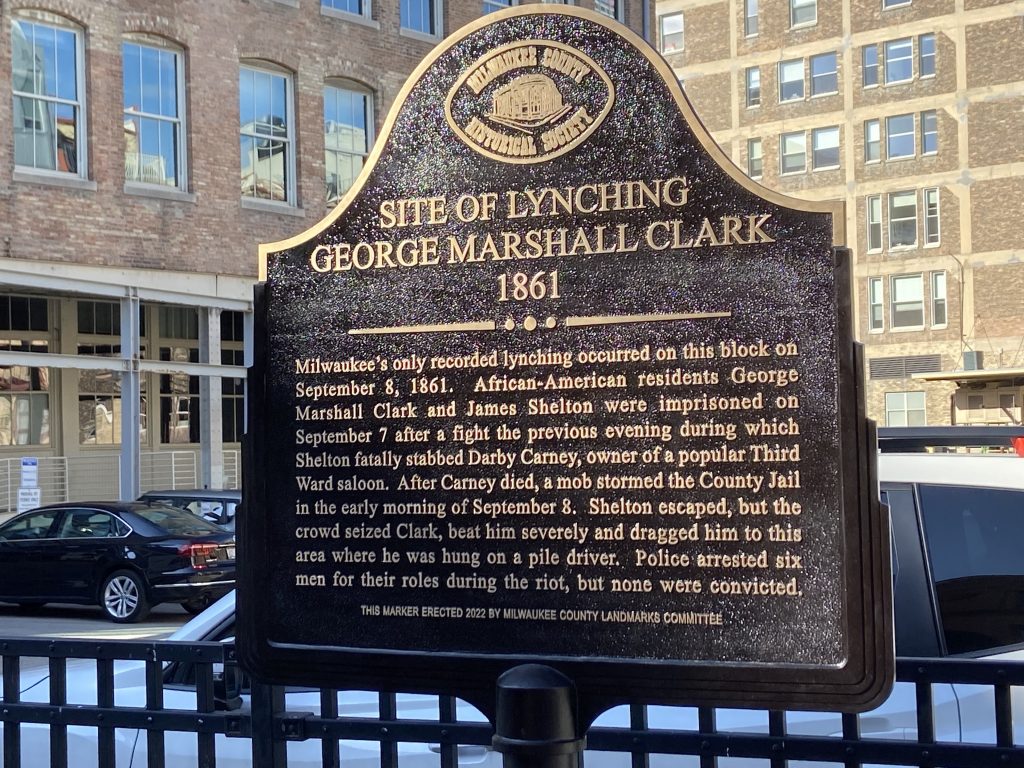George Marshall Clark Plaque Dedicated in Third Ward
Historic marker memorializes site of Milwaukee's only documented lynching.

Plaque denoting the site where George Marshall Clark was lynched in 1861. Photo by Graham Kilmer.
The Milwaukee County Landmarks Committee officially dedicated a plaque Wednesday at the site of Milwaukee’s only documented lynching.
The new plaque was installed just east of the intersection of S. Water Street and E. Buffalo St. in the Historic Third Ward, where in 1861 a mob lynched a Black man named George Marshall Clark.
“Today is not a celebration day, or a joyous day,” said Randy Bryant, chair of the county landmarks committee. “But a day to honor the memory of George Marshall Clark, and an important day to contextualize the history.”
George Marshall Clark came to Milwaukee in 1858 to join his father, George Marshall Clark, Sr., and learn his father’s trade: barbering. Three years later, on Sept. 7, he and another man, James Shelton, were imprisoned after a fight in a Third Ward saloon during which Shelton stabbed the saloon owner Darby Carney. After Carney succumbed to his wound, a mob formed and broke in the jail to attack the men. Shelton escaped but Clark was taken to the now marked spot on E. Buffalo Street and hung on a pile driver.
Clark was killed less than five months after the American Civil War began. As Bryant told the crowd gathered for the dedication, the city’s Black population was beginning to grow. “Many settled in Milwaukee because of the city’s reputation, though not totally deserved, as a center of abolitionist sentiment,” Bryant said.
The state and the city had ties to the underground railroad and the “relatively fluid conditions” for some of the new Black migrants allowed them to gain employment in trades, though economic exploitation and racial discrimination largely kept these newcomers relegated to domestic and menial jobs, Bryant said. Clark’s father ran his business on Wisconsin Avenue. And his killing would “change history for Milwaukee’s African-American families,” Bryan said.
“As we unveil this plaque, let us also unveil a commitment to change,” Bryant said. “Let us remember not only the pain, but also the strength that brought us together today. Let us remember the importance of unity, understanding and the fight against racism.”
The new plaque includes a brief history of Clark’s killing and Bryant said it was caste out of solid bronze. The landmark’s committee is a part of the Milwaukee County Historical Society.
Bryant was joined in the dedication Thursday by City of Milwaukee Mayor Cavalier Johnson and Milwaukee County Executive David Crowley. Both made history when they became the first Black person elected to their respective offices.
“I know that everybody always wants to remember… the sunshine and rainbows that happens in our community, but we cannot just choose to remember the pieces of our community’s history that shine a positive light,” Crowley said. “It is only by recognizing the deep social impacts of these events and remembering where we come from, that we can begin to heal and honestly look to the future.”
Crowley noted that the county declared racism a public health crisis in 2019. The county executive said “incredible strides” have been made toward racial equity since the killing of Clark, but that significant work remains.
Mayor Johnson echoed the county executive’s sentiments and noted that Clark’s is the only recorded lynching in Milwaukee’s history.
“And as we stand here,” he said, “it’s unimaginable to think about what transpired here, on this block, back in 1861.”
If you think stories like this are important, become a member of Urban Milwaukee and help support real, independent journalism. Plus you get some cool added benefits.
Political Contributions Tracker
Displaying political contributions between people mentioned in this story. Learn more.
- August 13, 2015 - Cavalier Johnson received $25 from David Crowley



















